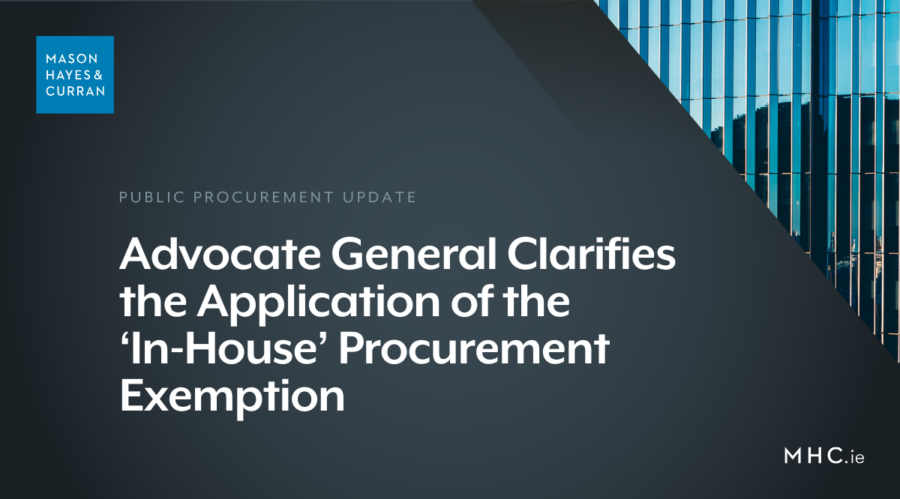Advocate General Clarifies the Application of the ‘In-House’ Procurement Exemption

An Advocate General has provided clarity on the application of the in-house, or Teckal, exemption which exempts certain contracts from the relevant EU directives. Our Public Procurement team considers the Advocate General Opinion and what this means in practice.
What you need to know
- The case concerns the interpretation of the ‘in-house’ exemption in the context of public contracts for the collection and processing of residual household waste.
- One condition of the exemption is that the controlled entity must perform more than 80% of its activities for the controlling authority or authorities.
- Advocate General (AG) Rantos considered how the 80% threshold should be calculated. Specifically, where the controlled entity forms part of a larger group, he examined whether the turnover of the controlled entity alone should be considered or the wider group turnover.
- The Opinion states that the consolidated group turnover should be used to calculate the 80% threshold. This should be done in accordance with Directive 2013/34/EU. If that Directive does not apply, the calculation should follow the concept of “undertaking” under competition law.
The ‘in-house’ or ‘Teckal’ exception
The ‘in-house’ exemption was established by the Court of Justice of the European Union (the CJEU) in its judgment in Teckal[1]. Since then, it has been codified in Article 12 of Directive 2014/24/EU on public procurement and Article 28 of Directive 2014/25/EU.
The exemption provides that certain public contracts awarded by a contracting authority are not subject to the public procurement rules. This applies where the contracting authority exercises control over the contractor similar to the control it exercises over its own departments. It also requires that the contractor carries out the essential part of its activities for the benefit of the contracting authority.
The basis for the exemption is that the contracting authority is in fact using its own resources and that the contractor to whom it is awarding the contract is effectively one of its internal departments.
The Directives sets out several conditions for the application of the in-house exception, all of which must be met:
- The contracting authority, either alone or jointly with other contracting authorities, exercises a control over the legal person similar to the control it exercises over its own departments
- More than 80% of the activities of the controlled legal person are carried out in the performance of tasks entrusted to it by the controlling contracting authority or authorities or by other legal persons controlled by that contracting authority(ies); and
- There is no direct private capital participation in the controlled legal person.
The calculation of the 80% rule
The case concerns proceedings related to public contracts for the collection and processing of residual household waste in Dutch municipalities. These contracts were directly awarded by Afvalsturing Friesland NV (AF) under the ‘in-house’ exemption. AF is a non-profit waste-processing organisation which is the head of a group of subsidiaries.
Based on the consolidated group turnover of AF, the percentage of activities was less than 80%. This would mean that the contracts would fall outside the exemption.
The CJEU was asked to consider whether, in these circumstances,the percentage of activities performed for the authority should be based on:
- The turnover of the controlled legal person, or
- The turnover of the entire group.
AG Rantos noted that neither ‘turnover’ nor ‘percentage of activities’ are defined in the Directive. He determined that, where the controlled legal person is a parent undertaking of a group, the consolidated turnover of the group is more likely to reflect whether the services provided are substantially intended for the contracting authority. This is because it provides a more accurate picture of the real and effective size of that legal person, making it possible to assess if it is likely to enter into competition with other undertakings.
Most importantly, AG Rantos pointed out that using the consolidated group turnover limits the risk of public bodies circumventing the principle of open competition. The alternative interpretation could lead to public bodies artificially dividing the structure of controlled undertakings to comply with the 80% threshold.
AG Rantos ultimately concluded that, where the controlled legal person is the head of a group, the 80% threshold must be calculated based on the group’s consolidated turnover, calculated in line with Articles 22 and 24 of Directive 2013/34. If that Directive does not apply, then the 80% threshold must be calculated on the basis of the concept of ‘undertaking’ under EU competition law.
The performance of tasks entrusted by the contracting authority
AG Rantos also had to consider whether turnover from third-party users should be included when calculating the turnover of the controlled legal person. He recalled previous case law which stated that all activities which the contractor carries out as part of a contract awarded by the contracting authority must be taken into account. This applies, regardless of who the beneficiary is (e.g. the contracting authority or the user of the service and who finances it. The decisive factor is whether that service actually results from the performance of the tasks entrusted to the legal person by the controlling contracting authority.
In this case, it was irrelevant that the landfill received waste deposited exclusively by third parties. What mattered was that it is operated on behalf of the contracting authorities and formed part of the performance of a task entrusted by the contracting authorities that control AF. Finally, the AG held that the fact that AF is in direct competition with private operators is not relevant as the in-house exception does not contain any condition limiting its scope to sectors which are not open to competition.
Conclusion
The application of the in-house exception is notoriously complex, and the Opinion provides welcome clarification on one of the conditions which must be met. It confirms that the exemption will be strictly interpreted. Contracting authorities should therefore exercise caution before relying on this exemption and carefully analyse whether each of the conditions in the relevant Directives is met.
It remains to be seen whether the Opinion will be followed by the CJEU in its judgment.
For more information, please contact a member of our Public Procurement team.
The content of this article is provided for information purposes only and does not constitute legal or other advice.
[1] Case C-107/98
Share this:


